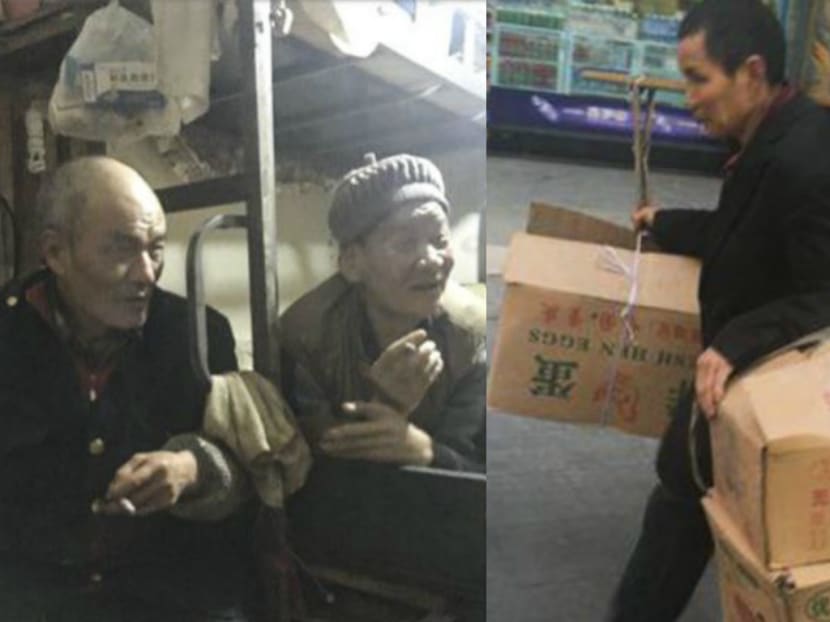Life in a ‘coffin home’: How poverty drove six elderly men in China to share a 161 sq ft room
CHONGQING — Six elderly men crammed into a tiny rented “coffin home” in southwest China has brought the plight of the poor, old and childless under the spotlight.

Six elderly men crammed into a tiny rented “coffin home” in southwest China has brought the plight of the poor, old and childless under the spotlight.
CHONGQING — Six elderly men crammed into a tiny rented “coffin home” in southwest China has brought the plight of the poor, old and childless under the spotlight.
The tenants, aged between 61 and 81, sleep on three bunk beds squeezed into a 161 sq ft (15 sq m) room in downtown Chongqing, a megacity and booming tourism spot, because they cannot afford to live in an elderly care home.
The main attraction, clearly, is the cheap rent – just 150 yuan (S$31) per month compared to the 1,300 yuan a month it would cost to live in a home for the elderly.
These childless, impoverished men endure mouldy bedding, constant noise and a virtual non-existence of personal space – but they have all found an unexpected benefit from sharing such a tiny space … and that is a caring atmosphere.
“There is something in our fates that led everyone here”, Mr Wang Gande, the 74-year-old landlord who lives with the men and ekes out a living pulling garbage carts, told China Youth Daily.
The cramped room provided a space where the tenants could take care of each other, Mr Wang was quoted.
Mr Wang, his tenants, and his disabled son who lives in another bedroom, all share a tiny kitchen, toilet and a living room.
Mr Wang said he enjoys the warmth of living together with the others and sharing meals with them.
Thus, for the past 20 years he has leased out the largest room in his 430 sq ft (40 sq m) flat to people like his current tenants – migrants from the countryside who never have had a child or a spouse.
The flat was a gift from the owner to Mr Wang’s wife – the owner’s former carer – before the owner died.
The men’s story is the latest example of the plight of poor, ageing and childless people in China who live together in tiny spaces – some no bigger than coffins – dubbed “coffin homes” by the media.
The emergence of the coffin home in China underlines the grim reality China’s elderly, often impoverished, people face.
The dilemma is expected to deepen as the percentage of people over age 60 in China is likely to climb to 28 per cent in 2040 from 12 per cent in 2010, according to the World Health Organisation.
Nearly 50 million Chinese elderly live below the poverty line of US$1.90 per day set by the World Bank, according to a 2014 research paper by Prof Zhu Xiao, a researcher at the Renmin University of China.
That group makes up 23 per cent of all elderly in the country, according to the study.
Those from rural areas were especially vulnerable to falling into poverty owing to the lack of social welfare institutions in place, said Mr Liu Kaiming, head of the Shenzhen-based NGO Institute of Contemporary Observation.
Many elderly people from the countryside effectively have no source of income, Mr Liu said. “The lack of a social welfare scheme is a common problem across China,” he said.
Although a unified elderly endowment insurance scheme in cities and villages was set up in 2014, the monthly claimable funds range is only 100 to 300 yuan, depending on local standards, Liu said.
For the men who live in Mr Wang’s flat, one day is much like the next.
Despite their ages, they rise early each day and work from dawn to midnight at a plethora of jobs. The goal is simple: making ends meet.
The occupations they have tackled range from collecting and then selling garbage to recycling stations, to selling candied fruits sticks on the street, to lugging heavy boxes at “wet” markets that sell fresh meat and produce.
Mr Luo Zhaofu, who sells candied fruits, said he failed to hold on to his chance to form a family when he was young.
Like some of his fellow tenants, Mr Luo was unwilling to follow the common practice in China of paying a “bride price” – the money or property a groom or his parents pay to a bride’s family before a wedding, usually worth thousands of US dollars.
“At least I would have had a child if I was willing to pay the money,” Mr Luo was quoted as saying.
It was unclear if the men received any government welfare payments or how much money they made. SOUTH CHINA MORNING POST









